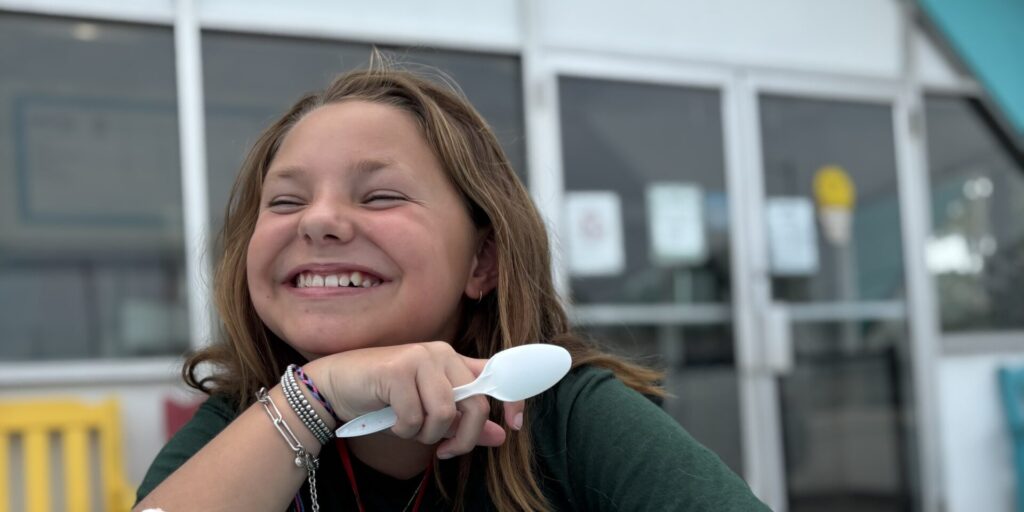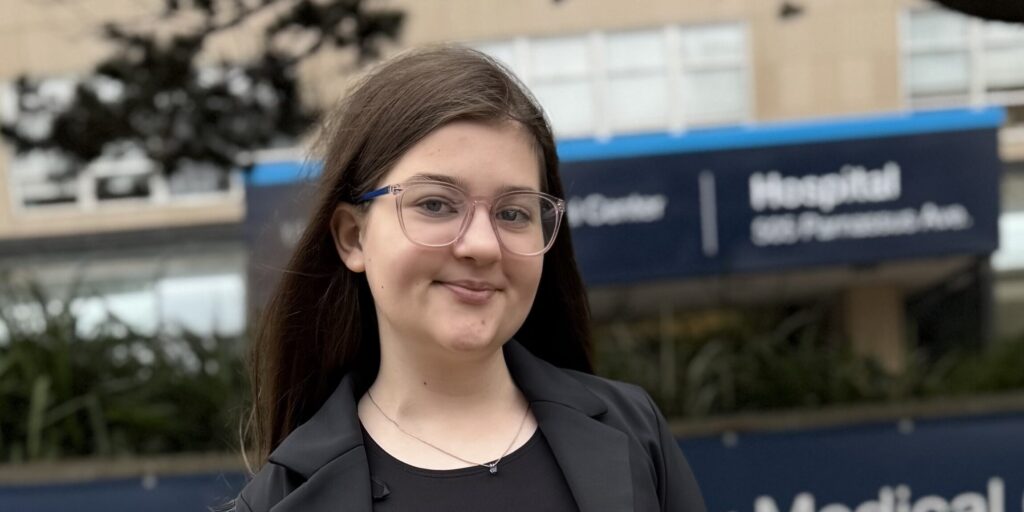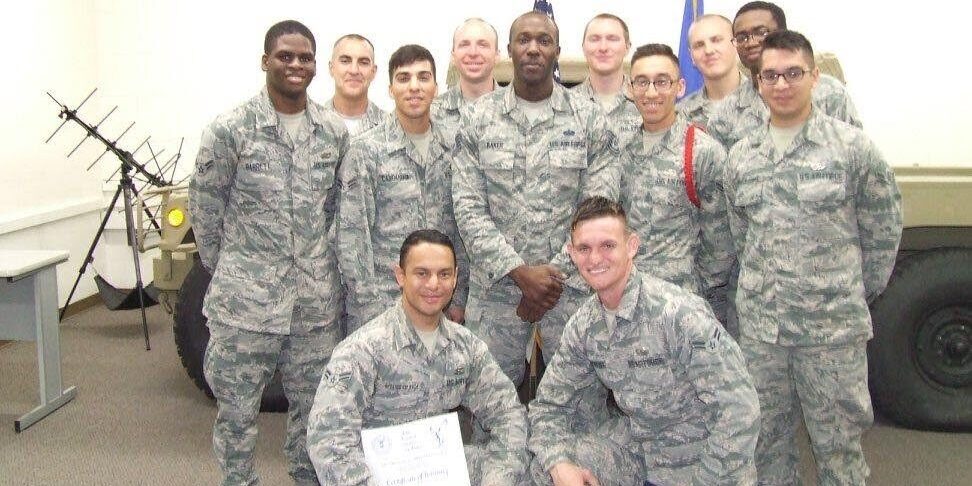
MDA Ambassador Guest Blog: A Veteran’s Journey
By Marshall Eckert | Tuesday, November 7, 2023
5 Second Summary
MDA Ambassadors play an essential role in furthering MDA’s mission while representing and empowering the neuromuscular disease community. Quest Ambassador Guest Blog series provides a platform to share their personal stories, perspectives, and experience.
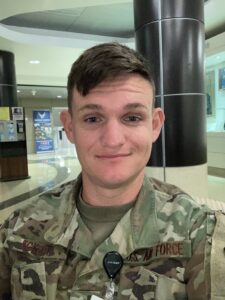
Marshall Eckert in the Air Force
Marshall Eckert currently resides in Virginia, just outside the capital, and navigates life with Limb-Girdle Muscular Dystrophy Type 2B. He is a proud alumnus of the Fold School of Public Policy at the University of Michigan and is a Presidential Management Fellow at the Federal Emergency Management Agency. Marshall and his wife recently welcomed their first child into the world and are cherishing every moment of their new adventure. Marshall also had the incredible experience of living in Italy for three years, where he savored the culture, cuisine, and the joy of exploring a foreign land.
In life, we often find ourselves on unexpected journeys, and my story is a testament to just that. During my senior year of college, a sudden realization struck me: this nation had provided me with opportunity and freedom, and I had yet to give anything in return. This epiphany ignited a deep-seated desire within me to serve my country and give back in meaningful ways. Inspired to follow in the footsteps of both my father and brother, I took the leap and enlisted in the United States Air Force. I was driven by the dream of serving in a capacity that made a tangible impact on protecting our nation and set my sights on a career in Special Operations, with a particular fascination for becoming a S.E.R.E. (Survival, Evasion, Resistance, and Escape) Operator. The path ahead seemed bright, filled with the promise of thrilling adventures and service like no other.
But life, as it so often does, had a different plan in store. During basic training, an inexplicable weakness began to infiltrate my legs, a sensation impossible to ignore. It quickly became evident that I couldn’t meet the rigorous physical demands required for special operations. Due to my inability to meet these requirements, I was informed that I would need to be reclassified into a new career path. Thus, I found myself in a medical holding facility, awaiting reassignment to a completely different role: Radio Frequency Operator, a far cry from my initial aspirations. Once my new classification was determined, I was able to proceed with my training and embrace my new career path.
The weakness in my legs persisted over the years, making each step feel like I was carrying the weight of concrete-filled boots. I found myself perpetually questioning whether there was a genuine issue with my legs and muscles, or if this was simply an inevitable part of aging. My legs remained in a constant state of soreness and discomfort, which, in turn, hindered my ability to meet the minimum fitness standards required for military service, particularly in terms of running. Despite my continuous mentions of these concerns during my yearly check-ups, my doctors didn’t express significant worry about the symptoms I described.
The turning point came when my lung unexpectedly collapsed (completely unrelated to my muscular dystrophy), leading to an urgent need for medical intervention. This medical emergency startled me into once again raising my concerns about the persistent weakness and sensation of “dead legs” with medical professionals. Fortunately, my collapsed lung compelled the doctors to take my complaints more seriously this time, leading them to initiate a series of comprehensive medical tests and consultations with specialists. After enduring three long years of uncertainty, I finally received a life-altering diagnosis: Limb-Girdle Muscular Dystrophy Type 2B (LGMD).
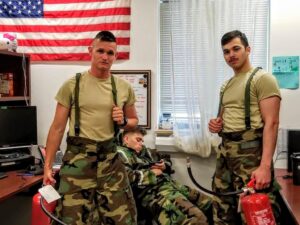
Marshall Eckert with Air Force friend
The moment I heard the diagnosis, my emotions were mixed. On one hand, it confirmed that the pain and weakness were not mere figments of my imagination; there was now a concrete explanation for them. On the other hand, it also signaled the conclusion of my military service. Despite the inability to pursue my dream of serving in a special operations role, I found solace in the fact that I was able to contribute to meaningful and intriguing work that played a major role in protecting Americans. My position allowed me to be a part of a highly skilled and capable team, which was something that I was grateful for. Although the decision was heart-wrenching, it was an undeniable necessity for the sake of my health.
Life’s transitions are always challenging, but my new diagnosis amplified the complexity. Uncertainty loomed over me for the first time, casting shadows of doubt on my ability to make a meaningful impact on the world. The discomfort I felt within my own body was profound, a stark reminder of the hurdles I now faced. It was time to recalibrate my vision of the future.
Following my discharge from the Air Force, I embarked on a new chapter, fueled by the desire to expand my knowledge and skills while seeking a fresh sense of purpose. I decided to pursue higher education and enrolled in graduate school at the University of Michigan. While pursuing my degree, I discovered the Presidential Management Fellowship program, a prestigious and highly competitive leadership development program in the United States government. It is designed to attract, develop, and retain talent for federal service. PMF provides recent graduate students with the opportunity to work in various federal agencies, gaining exposure to different roles and responsibilities in the public sector.
The program reignited my commitment to serving my country, albeit in a different capacity. This program held the keys to a brighter future, guiding me toward an unexpected yet profoundly fulfilling career path.
My journey led me to the Federal Emergency Management Agency (FEMA), where I assumed the role of a Program Analyst. At FEMA, I am rediscovering a sense of purpose and have found an avenue to make a meaningful impact on the nation’s disaster response and recovery efforts.
Working at FEMA allows me to leverage the skills and experiences I gained in the Air Force and graduate school. It also offers me a platform to continue serving my country, despite the physical challenges my condition presents. Each day, I collaborate with a dedicated team to ensure our communities are well-prepared for and can effectively recover from disasters. I find great encouragement in knowing that I can adapt to my ever-changing physical needs and continue to contribute to the service of my country.
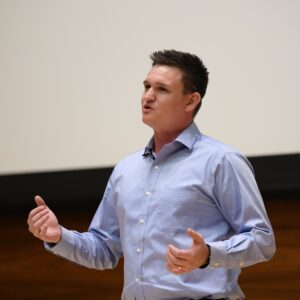
Marshall Eckert working at FEMA
My journey from the military to my unexpected diagnosis of LGMD was marked by unexpected twists and turns. While it brought challenges that I had never anticipated, it didn’t diminish my profound gratitude for the time I spent in the armed forces. My four years in the military were an invaluable part of my life, instilling in me the core values of service, discipline, and dedication.
Though my LGMD diagnosis forced me to step away from the path I had initially envisioned, it didn’t change my ability to serve my country. Rather, it transformed the capacity in which I could serve, emphasizing the adaptability and resilience that are essential qualities of a veteran. I am deeply thankful for the experiences, opportunities, and sense of purpose that my military service and subsequent career at FEMA have provided. It’s a testament to the unwavering spirit of a veteran, committed to serving the nation in every way possible, no matter the challenges we face.
Next Steps and Useful Resources
- Learn more about Limb-Girdle Muscular Dystrophy (LGMD) here.
- Browse MDA’s Innovations in Care.
- MDA’s Resource Center provides support, guidance, and resources for patients and families. Contact the MDA Resource Center at 1-833-ASK-MDA1 or ResourceCenter@mdausa.org
- Stay up-to-date on Quest content! Subscribe to Quest Magazine and Newsletter.
Disclaimer: No content on this site should ever be used as a substitute for direct medical advice from your doctor or other qualified clinician.


